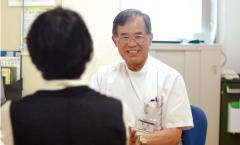- Página de topo de Yokohama-shi
- Página de topo de Naka-ku
- Várias palavras (Multilingues)
- English
- Public Relations Magazines
- Versão de ala de Koho Yokohama Naka (... 2023)
- 2020
- August - What you need to know about dementia
É o texto daqui.
August - What you need to know about dementia
Versão de sumário de Koho (Relações públicas) edição de Yokohama Naka Ward (informação pública Yokohama, なか 区版)
Data atualizada por última vez: 2020/8/7
What you need to know about dementia
Dementia is a common condition. In fact, 1 in 4 people aged 65 years or above have dementia or are at risk of developing dementia. And dementia can affect anyone.
Therefore, it is important for everyone to know the facts about dementia and to show understanding so as to allow those with dementia to continue living in peace of mind in their familiar surroundings.

Mr. Takahiro Sugiyama
Vicerepresentante do conselho de diretores, associação de Alzheimer Japão
Director, Kawasaki Saiwai Clinic
Increasing difficulty in coping with daily life tasks = an indication of dementia
Everyone is forgetful from time to time, but is still able to carry on in daily life as usual. But your life would be thrown into turmoil if you were regularly unable to recall the names of family members or kept forgetting things. A demência é uma condição que faz que ao funcionamento intelectual de uma pessoa diminua, que à sua vez tem um impacto sério na capacidade daquela pessoa de conduzir uma vida normal.
Guidelines for detecting dementia at an early stage
A chave ao descobrimento de demência em uma primeira etapa deve realizar que você ou alguém mais são «de qualquer maneira diferentes ao habitual». Por favor use a seguinte lista para verificar-se. Of course, it is not possible to determine whether or not someone has dementia on the basis of this list alone, but you or someone you know many have dementia if several of the following apply.
□I às vezes esquecem a data de hoje ou o dia da semana
□I às vezes esquecem o meu endereço ou número de telefone
□I dizem ou perguntam a mesma coisa repetidamente
□I às vezes vão pagar por algo da loja mas não podem realizar quanto
□I às vezes não pode lembrar-se dos nomes de coisas
□I esquecem onde pus coisas e esqueço de guardar coisas mais muitas vezes do que antes
□I às vezes perdem-se andando ao longo de vias familiares
□I ficaram facilmente irritados por coisas triviais
□I não são já capazes de apagar o gás ou fogo sozinho
□I não são já capazes de fazer funcionar a máquina lavável, controlador remoto, etc. que tenho usado até agora
□I às vezes encontram que ele muito entende o conteúdo de livros ou segue o lance do enredo em um drama de TV
□I muitas vezes pensam que alguém roubou a minha carteira, olhe, etc.
□I às vezes esquecem o que quis dizer no meio da fala
□I ficaram despenteados na aparência
□I não têm motivação para fazer algo apesar de ser bem fisicamente.
If 6 or more of the above apply to you or someone you know, I encourage you to speak to a doctor to receive a proper diagnosis.
Source: O conhecimento (Àqueles que se preocupam que a demência é direita a você que se preocupa com «o esquecimento
about becoming more forgetful: Uma compreensão própria de demência)»
(Publisher) NHK Public Welfare Organization (Editor) Kenji Kosaka
Tips for seeking medical advice
There are many benefits of seeking an early diagnosis. You may need to think of some creative ways to persuade the person in question to go to a doctor if he or she shows reluctance.
- Consult at a nearby medical institution, such as your regular internal medicine doctor or a dementia clinic
- Caregivers should accompany the individual concerned to his or her hospital appointment
- Take a memo of the progression of symptoms, things the individual is having trouble with, and any other requests for the medical examination, and hand it over at the reception desk
Even young people sometimes develop dementia
Dementia can also affect young people. This is known as early-onset dementia. Younger patients often lack adequate financial resources, making the situation even more serious for their caregivers.
Hardships of caregivers that others may find hard to understand
People may find it hard to understand or imagine how it would feel to suffer the kinds of symptoms that would lead you to forget the faces of family members. What is more, dementia sufferers are often able to talk to and respond to questions from others normally, giving the impression that there is nothing wrong with them. This is why others sometimes find it hard to understand when family members talk about their hardships.

Therefore, if those suffering from dementia and their families are to continue living in peace of mind, it is necessary for everyone to gain a fuller understanding of dementia and provide comprehensive support to both the individual concerned and their caregivers.
Enabling anyone who develops dementia to continue living in peace of mind in their familiar surroundings
Caravan Mates
This program trains individuals to become dementia supporters with a proper understanding of dementia and the capability to provide patients and their families with warm support in the community and in the workplace. Caravan Mates are people who work as instructors on courses which train these dementia supporters. They work on the ground to increase the number of supporters in the hope of building a more considerate society.

Ms. Noriko Shirai
Holds visiting courses at neighborhood associations in Area 4 North
During these courses, I use skits to get participants to observe interactions between dementia patients and their families, and think about how they would act in such a situation. Following this, I give a talk on recommended responses, and convey the key points for when dealing with people who have dementia. Some participants have told me that my advice helped them know how to act in actual situations. I hope to continue raising awareness among people and learn with my fellow Mates so as to be able to provide a source of support to caregivers.
Dementia consultations
Eligibility: Those who wish to consult about dementia and other memory-related problems along with their families
Where to go: Koreisha Shien Tanto (Elderly Support Section), Naka Ward Office
Counselling for caregivers
Eligibility: Families caring for dementia patients, etc.
Where to go: Koreisha Shien Tanto (Elderly Support Section), Naka Ward Office

Consultation services/organizations
Koreisha Shien Tanto (seção de suporte idosa), telefone de trabalho de Naka Ward: 224-8167 FAX: 224-8159
Community General Support Center (within Community Care Plazas)
Shinyamashita Community Care Plaza TEL: 625-1911 FAX: 625-1865
Furocho Community Care Plaza TEL: 662-0161 FAX: 662-0192
Mugita Community Care Plaza TEL: 664-6023 FAX: 664-6075
TELEFONE de Honmokuhara Community Care Plaza: 623-0971 FAX: 623-0977
TELEFONE de Minosawa Community Care Plaza: 663-6960 FAX: 228-1828
Honmokuwada Community Care Plaza TEL: 622-1211 FAX: 622-1290
Carteira de identidade de página: 121-508-705












